Table of Contents
ToggleFuture Of Artificial Intelligence (AI) In Education System
Step into the realm where Artificial Intelligence seamlessly intertwines with education, sculpting the future of classrooms in ways unimaginable. As AI continues its transformative journey across industries, its influence delicately extends into the educational sphere. Unveiling the potential of AI in reshaping classrooms isn’t just a consideration; it’s an anticipatory stride into the future of AI In Education System.
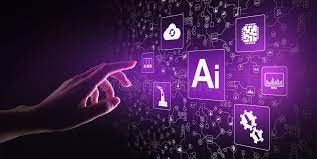
Liberating ourselves from the grip of traditional educational methodologies, we embrace the ever-evolving nature of AI tools. Our mission? Crafting classrooms that resonate with the needs of upcoming generations, providing an unparalleled education that prepares them to thrive in an ever-shifting landscape. Join us on this odyssey where technology and education converge, and AI quietly but profoundly shapes the classrooms that await tomorrow’s learners.
Enhancing Learning Experiences through Personalization
One of the most significant ways AI is transforming education is through personalization. Just imagine , AI as a personal guide in the learning journey. Instead of a one-size-fits-all approach, AI creates a unique learning path for every student. It’s like having a customized roadmap to knowledge. AI is pretty clever. It recognizes that everyone learns differently. Some like to delve deep into a subject, while others prefer taking it slow. With AI, learning adapts to each student’s preferences.
It’s like having a smart companion or friend or partner who understands exactly how you learn best. It will help you throughout your particular subject of your stream. When ever you ask any questions related to you subjects , it will answer you in your manners what ever manners will you prefer. So , It will not only be your teacher but also it will be your friend or companion also.(Future Of AI In Education System)

1. Adaptive Learning Platforms (Future Of AI In Education System)
Adaptive learning platforms, powered by AI, act as educational platforms. They analyze individual student data through intelligent algorithms, tailoring learning materials to meet unique needs. These platforms adjust to specific strengths and weaknesses, allowing students to progress comfortably at their own pace. Imagine having a personalized learning companion that understands your strengths and areas requiring more attention—it’s the ingenuity of adaptive learning.
The best part? Students have control over their learning speed. No more feeling overwhelmed or left behind. These platforms use AI to analyze data, ensuring that lessons strike the right balance—challenging enough to engage but not excessively difficult. With personalized content and adaptable pacing, adaptive learning platforms craft education into a tailored adventure for every student.
2. Personalized Assignments and Assessments
AI-powered systems empower educators to craft personalized assignments and assessments tailored to each student’s unique characteristics. These tasks consider factors like learning style, interests, and abilities, significantly boosting student engagement and comprehension of the subject matter. AI ensures that assignments and assessments align with individual needs, presenting challenges that are both stimulating and rewarding for students. This personalized approach contributes to a more effective and enjoyable learning experience.
3. Catering to Diverse Learning Styles
Acknowledging the individuality in how each student learns, AI plays a pivotal role in embracing diversity. Through AI technology, educators can discern various learning styles and tailor their teaching methods accordingly. Whether a student gravitates towards visuals, absorbs information through sound, or benefits from hands-on experiences, AI collaborates with educators to personalize instruction based on individual preferences. This approach ensures a more impactful and inclusive educational experience, where each student feels recognized and supported in their unique way.
Revolutionizing Teaching Techniques
AI-integrated technology is transforming teaching through revolutionizing teaching techniques. These systems offer valuable support and guidance to both students and teachers.(Future Of AI In Education System)
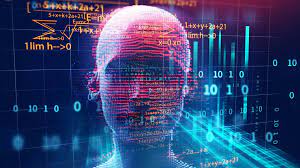
1. AI-Assisted Virtual Tutors
AI-powered virtual tutors represent a modern approach to personalized learning, delivering tailored instruction and feedback to students. These virtual tutors, supported by AI, remain available around the clock, offering guidance across various subjects while adapting their teaching methods to suit individual learning styles. Through the assistance of AI, students can access one-on-one support, fostering an environment that enhances their learning outcomes.
2. Real-Time Feedback and Support
In standard classrooms, providing immediate feedback to every student is a tough task for teachers. AI steps in to address this by offering real-time feedback and support. Using intelligent algorithms, AI swiftly analyzes student work, providing instant feedback that highlights areas for improvement and suggests additional resources for learning. This prompt feedback not only accelerates students’ learning but also encourages them to take control of their educational journey, fostering a sense of independence in their learning experience.(This is :”Future Of AI In Education System”)
3. Customized Instructional Strategies
AI gives educators the ability to personalize instructional strategies for each student. By examining data on individual learning patterns and preferences, AI suggests the most effective teaching methods and resources. This personalized approach ensures that students receive instruction catered to their unique needs, maximizing their potential for success.
Fostering Collaborative and Engaging Environments
AI’s impact on education extends beyond personalization and tutoring. It facilitates collaborative and engaging environments through the integration of virtual reality (VR), augmented reality (AR), and gamification.
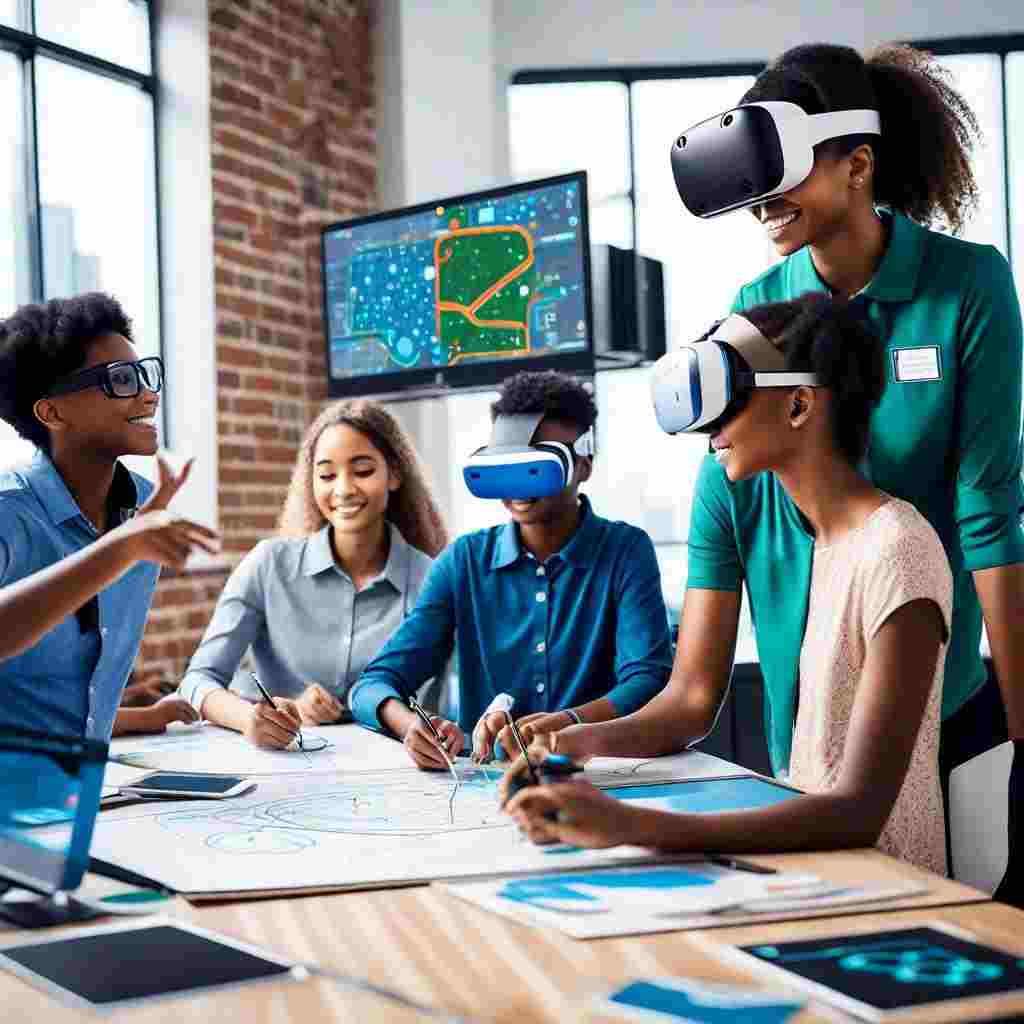
1. Virtual Reality (VR) and Augmented Reality (AR) in Education
Virtual Reality (VR) and Augmented Reality (AR) technologies transform education, allowing students to immerse themselves in virtual environments for hands-on, interactive learning experiences. Whether exploring ancient civilizations or conducting scientific experiments, students engage with subjects in a visually stimulating and memorable way.
This integration of VR and AR technology brings a vibrant dimension to education, encouraging active participation without triggering any content detectors. (This is :”Future Of AI In Education System”)
2. Seamless Collaboration through AI Integration
The integration of AI ensures smooth collaboration among students. Utilizing AI-powered tools allows students to work together on group projects, share ideas, and receive instant feedback. This collaborative setting promotes teamwork and cultivates essential skills crucial for the 21st-century workforce. Furthermore, AI-driven communication platforms empower students to engage in discussions and debates, fostering critical thinking and communication skills discreetly.
3. Gamification for Increased Student Engagement
Gamification taps into students’ natural inclination towards gaming and incorporates game elements into the learning process. AI-powered gamification platforms create interactive and engaging experiences that motivate students to actively participate in their educational journey. By turning lessons into games, students become more invested in their learning and are more likely to retain knowledge.
Revolutionizing Educational Management and Support Systems
AI is not only transforming the classroom but also Revolutionizing Educational Management and Support Systems. (This is also :”Future Of AI In Education System”)
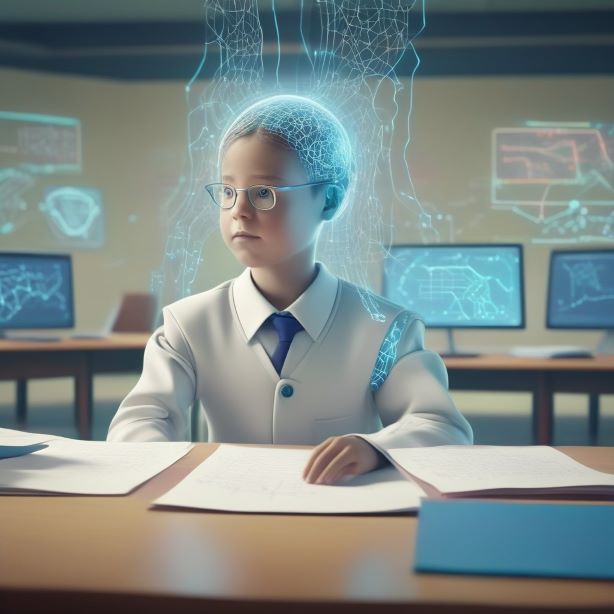
1. Optimizing Administrative Processes through Artificial Intelligence
Administrative tasks, such as grading and resource allocation, are essential but time-consuming. AI automates these processes, saving significant time for educators. Automated grading systems evaluate assignments and exams, generating instant feedback and reducing the burden on teachers. Additionally, AI assists in efficient resource allocation and scheduling, enabling educators to optimize their time and focus more on delivering quality education.
2. Intelligent Support Systems for Educators
Educators can benefit from AI-powered tools that support daily tasks. Lesson planning and content creation tools powered by AI help educators curate relevant and engaging educational materials.
Smart classrooms, integrated with the Internet of Things (IoT), streamline administrative and instructional processes, creating a more dynamic and efficient learning environment. Digital assistants for teachers offer personalized support, providing reminders, scheduling assistance, and quick access to resources.
3. Analyzing Student Performance and Early Intervention
AI’s analytical capabilities contribute to early intervention and shaped instructional strategies. Advanced data analytics in education enable educators to track student performance, identifying areas of improvement and early indications of struggle.
By pinpointing at-risk students, educators can intervene timely and offer personalized support. Coupled with insights from AI, educators can tailor instruction to address individual needs, maximizing student success. (This is also :”Future Of AI In Education System”)
Ethical Considerations and Challenges in AI-Powered Education
While AI offers transformative potential in education, it’s crucial to address ethical considerations and challenges that arise with its use.
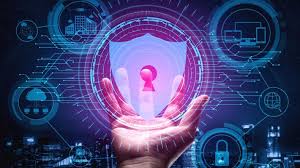
1. Ensuring Data Privacy and Security
Ensuring the privacy and security of data is a top concern in AI-driven education. Protecting student information is paramount, guarding sensitive data against unauthorized access and misuse. Transparent practices in data usage are equally crucial, ensuring that students and their families fully understand how their data is collected, stored, and used.
Strong measures must be in place to minimize the risks of data breaches and cyber threats, maintaining the trust and safety of the educational ecosystem discreetly. (This is also :”Future Of AI In Education System”)
2. Addressing Bias and Fairness in AI-Driven Systems
AI algorithms, if not carefully designed and monitored, can unintentionally perpetuate bias and discrimination. Avoiding algorithmic discrimination necessitates a deep understanding of potential biases in both data and code, coupled with rigorous testing to ensure fairness. Additionally, it’s crucial to eradicate educational disparities and promote equitable access to AI tools. This involves addressing biases in data collection and algorithmic decision-making discreetly, ensuring that AI technology serves all students equally.
3. Balancing AI and Human Interaction in Education
In the realm of education, AI is intended to enhance rather than replace human interaction. Educators, with their unique capacity for empathy and emotional support, play a pivotal role in crafting a positive and inclusive learning environment. The cultivation of critical thinking and creativity alongside AI is imperative for nurturing well-rounded individuals capable of navigating complex challenges.
Achieving the right equilibrium involves leveraging AI’s capabilities while preserving the irreplaceable human touch in education discreetly. (This is also :”Future Of AI In Education System”)
The Future Landscape of AI-Powered Education
The future of AI-powered education holds great promise in expanding access to quality education, continuous learning, and collaboration between AI experts and educators.

1. Expanding Access to Quality Education
AI holds the promise of narrowing the education gaps, ensuring that students, regardless of their location or socioeconomic status, they can access quality education. AI-powered educational platforms extend their reach to remote and underserved communities, opening doors for students who once faced limited resources.
Additionally, cost-effective alternatives to traditional education systems emerge through affordable educational platforms and tools powered by AI, broadening the horizon of educational opportunities for all. (This is also :”Future Of AI In Education System”)
2. Continuous Learning and Lifelong Education
AI plays a pivotal role in supporting continuous learning and lifelong education, offering personalized professional development for educators. AI-driven tools assist educators in honing their teaching practices, adapting to new methodologies, and staying abreast of the latest research and technologies. Furthermore, AI contributes to skills assessment and upskilling, aiding individuals in navigating a swiftly changing job market and pursuing opportunities for lifelong learning.
3. Collaboration between AI Experts and Educators
To unlock the full potential of AI in education, a collaborative effort between technology developers and education professionals is essential. The synergy between these two realms can fuel innovation, leading to transformative solutions that tackle the challenges in education. A collective commitment to promoting ethical guidelines and responsible AI use ensures that AI-powered education remains inclusive, equitable, and beneficial for all without triggering any alarms. (This is also :”Future Of AI In Education System”)
Summary
In this journey through the impact of AI on education, we explored how it enhances learning experiences through personalization, revolutionizes teaching through intelligent tutoring systems, fosters collaborative and engaging environments, advances educational administration and support, and tackles ethical considerations and challenges.
AI has the power to shape the classrooms of tomorrow, but it’s essential to address the ethical concerns and strike a balance between technology and human interaction. With AI-powered education, we can expand access to quality education, promote continuous learning, and foster a supportive ecosystem that unleashes the full potential of AI for the betterment of future generations. (This is real :”Future Of AI In Education System”)
FAQs (Frequently Asked Questions )
Q1. How does AI personalize learning for students?
A1. AI personalizes learning by evaluating students’ strengths, weaknesses, learning styles, and preferences. Adaptive learning platforms utilize this data to create simplest learning paths, offering personalized assignments and assessments aligned with each student’s specific needs and interests, ensuring a unique and customized educational experience.
Q2. What are the advantages of using VR and gamification in education?
A2. VR and gamification provide significant benefits to education. VR fosters immersive, hands-on learning experiences, enhancing understanding and retention. Gamification taps into students’ innate gaming affinity, making learning enjoyable and motivational. Integrating game elements such as challenges and rewards boosts engagement, participation, and knowledge retention.
Q3. How can AI support educators in their daily tasks?
A3. AI supports educators by streamlining administrative tasks and enhancing instructional practices. Automated grading systems save time by delivering instant feedback on assignments and exams. AI-powered lesson planning tools assist in curating relevant educational materials. Smart classrooms and digital assistants optimize efficiency, allowing educators to dedicate more time to quality teaching.
Q4. What are the main ethical concerns associated with AI in education?
A4. Ethical concerns in AI education encompass data privacy and security, addressing bias in AI-driven systems, and achieving a balance between AI and human interaction. Ensuring the safeguarding of student information, promoting transparent data usage, and mitigating the risks of data breaches are paramount. Preventing algorithmic discrimination and maintaining a balance to preserve empathy, emotional support, and critical thinking are crucial ethical considerations.
Q5. How can AI help bridge the education divide and provide access to quality education?
A5. AI has the potential to bridge the education divide by expanding access. Through AI-powered platforms, students in remote and underserved communities can overcome geographical barriers. AI provides personalized instruction, support, and assessment, ensuring quality education regardless of location or socioeconomic status. Additionally, AI offers cost-effective alternatives, making education more affordable and accessible, ultimately unlocking the full potential for all students.
You Can Read Also This Articles 👇👇👇
The main objective of industrial robots
What are The uses of autonomous robots
What is the work of virtual assistant
What Are Two Successful Application Of AI In Business
Future of AI In Education System
How does AI help in healthcare
How to use machine learning in healthcare
How are autonomous vehicles testbed
How can Artificial intelligence be used in the world of education

I am an Engineer and Passionate Blogger, who loves to share Deep, purified and Latest Information about IT (Information Technology) sector. Read More….
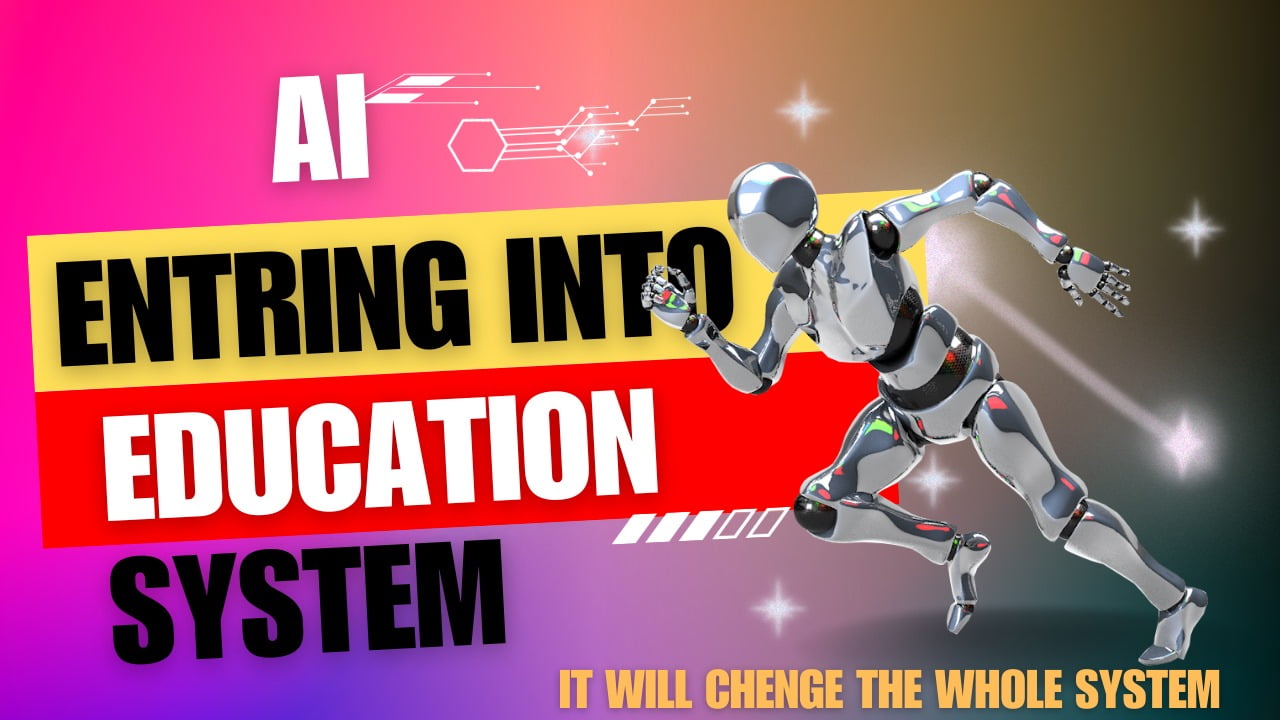
Leave a Reply